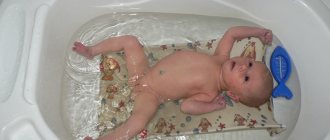Many parents complain about their children being too capricious. Of course, the main question for mothers is what to do when capriciousness becomes a constant state of the baby. How to react correctly - ignore, scold or distract? But you should understand that it is equally important to find the reason for this child’s behavior. Your solution to this problem depends on it. Parental struggle with whims - how to raise a child correctly?
What signs can be used to determine the beginning of a crisis period?
Like any story, a crisis has a beginning, development and an end. The easiest way, of course, is to act while it is just in its infancy, without leading to a deterioration in the relationship with your very capricious child; at 1 year old this is very important, but sometimes we don’t know what to do , which path to choose. At this moment, it is important to learn to identify and understand the difference between an emerging crisis and simply the onset of a disease in a child.
The first signs of a crisis are the following:
A capricious child: what is the reason?
Not a single action of a child arises on its own - out of nowhere. Any action is a reflection of the baby’s feelings and internal state. The main reasons for excessive moodiness are usually:
- Health problems. The child does not always understand that he is sick, hungry or tired. If he is too small or overwhelmed with emotions, he cannot express his condition. This discomfort is expressed in capricious behavior.
- Excessive care from parents and relatives. The desire to protect the baby from dangers and various mistakes often leads to the child completely losing the need to demonstrate independence. The consequence of total control, blowing away dust particles and the tradition of doing everything for the child is the inability and unwillingness of the child to grow up. In this case, the child’s capriciousness, as a rule, means he is spoiled.
- Three-year-old crisis. Many mothers notice drastic changes in a child of this age. First of all, this is due to the fact that the baby declares himself as an individual and demands freedom for himself. The child begins to rebel against overprotection, expressing this to the best of his ability - that is, by capriciousness.
- Relationships and microclimate in the family. The flow of information from the outside, active communication and new impressions is the main reason for the baby’s fatigue. Therefore, at home he expects peace, stability and an atmosphere of love between his parents. In the absence of such (quarrels and scandals, changes in life, etc.), the child begins to protest. This is where capriciousness, tearfulness and other reactions of the baby to a reality that does not suit him appear.
Why does the crisis of the first year of life appear?
This is a natural process of developing a child’s personality. Just recently the baby was helpless and couldn’t do anything. During the first year he learned a lot - sit, walk, eat on his own, he matured noticeably. The child wants to explore the world around him without restrictions. He does not understand why he is not allowed to spread porridge on the table or play with sharp objects. Therefore, he begins to be mischievous and protest. This behavior is called whims. And the main thing here is that whims do not develop into hysteria. The difference between these two concepts is colossal: during a hysteria, the baby no longer controls himself at all and cannot compromise. He generally stops communicating as a person, and switches to communicating like an animal - he simply defends himself. During hysterics, you should never use punishment; it is important for you at this moment to sensibly assess the situation, looking at it from the outside. At this time, you cannot get irritated yourself, otherwise you will have a hysteria in the child and the parent, each of whom will need to be calmed down separately.
Tantrums in a one-year-old baby
Stubbornness and whims
Even the softest, most obedient, calmest children are sometimes capricious. Stubbornness and “negativism” begin to develop as early as one year of age. But after two years, it reaches new heights and takes on new forms. a one-year-old child contradicts his mother, a three-year-old child contradicts himself. He has difficulty making decisions. And then he wants to change everything. The child behaves as if he wants to throw off someone’s yoke, although no one intends to suppress him except himself. He wants to do everything his own way. He gives up what he used to like. He does everything to spite you, he shows disobedience in everything. Even to the detriment of their own interests. His main slogan: “I myself!”
The smile of tenderness on the faces of the parents is replaced by an expression of puzzlement, confusion and some irritation. Many do not know that at this time a mental process that is important for the child occurs: this is the first vivid expression of his “I”, this is his attempt to independently distance himself from his mother, remove the psychological “umbilical cord,” learn to do a lot on his own and somehow solve his problems. Without psychological separation (separation) from parents, it will be difficult for a child to find himself in this life, to develop mechanisms of psychological adaptation and flexible behavior.
This period is natural and natural in the development of a child. It is also called a developmental crisis. Developmental crises are relatively short (from several months to a year or two) periods in life, during which a person changes noticeably and rises to a new stage in life. Crises occur at the age of 1 year, 3 years, 7 years, 13 years, since a person’s personality develops continuously. In this case, there is always a change of periods: relatively long and calm - stable and shorter, stormy - critical, thus, crises are transitions between stable periods.
Crises are necessary. They are the driving force of development, its peculiar steps, stages of change in the child’s leading activity. Parents should not be afraid of the severity of the crisis; this is not a negative indicator at all. On the contrary, the child’s vivid manifestation of self-affirmation in a new age-related quality indicates that all age-related new formations have developed in his psyche for the further development of his personality and adaptive abilities.
And, on the contrary, external “crisis-free” behavior, which creates the illusion of well-being, can be deceptive and indicate that no corresponding age-related changes have occurred in the child’s development.
Thus, there is no need to be afraid of crisis manifestations; problems of misunderstanding that arise at this moment among parents are dangerous.
The main task of parents is to act competently to mitigate the manifestations of the crisis. How to help a child get out of it without enduring negative qualities in his soul: after all, stubbornness is an extreme degree of manifestation of will, a quality necessary for a child; capriciousness - demonstrating one’s own importance to others, a sense of one’s “I”; egoism - in a healthy form, a sense of “selfhood”, one’s own dignity; Aggression is an extreme form of self-defense; isolation is an inadequate form of displaying healthy caution, that is, qualities necessary for survival in society. The child must emerge from the crisis with a set of positive qualities; the main task of parents and teachers is to prevent their extreme manifestations from becoming entrenched.
What can parents do during periods of crisis, how to react to whims and stubbornness?
Do not attach much importance to stubbornness and capriciousness. Take note of the attack, but don't worry too much about your child.
As soon as the child begins to act up, stay close to him and let him know that you understand him. Open your arms to him, assure him of your love and try to distract him from the whim that has excited him so much. However, do not reward your baby with anything.
If you fail to do this, leave the child alone and do not pay attention to him. Let your soul vent, but don't take part in it.
Do not try to instill anything in your child at this time - it is useless. Swearing is pointless; spanking will agitate him even more.
Be persistent in your behavior with your child. If you said no, continue with that opinion.
Don’t give up even if your child has a seizure in a public place. Most often, the only thing that helps is to take him by the hand and lead him away.
Remain calm and indifferent to his behavior, no matter what he does. The main thing is to interfere as little as possible and rush the child.
When the storm subsides, talk to your child kindly. Tell him how upset you were that he was raging over a mere trifle. Express your confidence that he will behave better in the future. Reassure your child that you still love him and are convinced that he will never behave badly again, even if something does not turn out the way he wants. A similar conversation with the baby is necessary. So that he does not feel guilty, as often happens after violent outbursts of anger.
Use distractions. For example, your baby does not want to eat, although he is hungry. Don't beg him. Set the table and place a bear on the chair. Pretend that the bear has come for lunch and is asking the baby, like an adult, to try to see if the soup is too hot, and, if possible, to feed him. The big child sits down next to the toy and, unnoticed by himself, while playing, eats the entire lunch together with the teddy bear.
At three years old, a child’s self-confidence is flattered if you call him on the phone, send letters from another city, ask for his advice, or give him some “adult gifts like a ballpoint pen.” For the normal development of the baby, it is desirable during a crisis for the child to feel that all the adults in the house know that next to them is not a baby, but an equal comrade and friend.
Advice from experienced parents
Mother Elizaveta, daughters Arina (3 years old) and Polina (1.1 years old).
Arina became a capricious child at exactly 1 year old .
Almost as soon as the youngest appeared, she began to understand that she wanted all my attention, but I could not give it to her. In the end, I did this: we tried to do everything together, and when I had free minutes, we played together. Therefore, our relationship improved and there were much fewer whims. Now the youngest truth has become a very capricious child at 1 year old. But I already know exactly how to act, what to pay attention to, and where it is better to ignore a whim. Mom Anna, son Artem (5 years old) The child became capricious at the age of 1 , but I, armed with information in advance, knew exactly what to do . We never had hysterics, but we had a lot of whims. It seemed to me then that this was not my son at all, that someone had replaced him. I watched a lot of programs, listened to the advice of experienced psychologists, so I knew that my calmness and love for my son could overcome any crisis and all his whims would remain a thing of the past. And so it happened, we especially actively supported our baby for about a month, and then everything settled down and fell into place. Now he is also going through something like a crisis, but not so aggressively. Mom Natalia, son Leonid (8 years old) and daughter Elena (6 years old)
At one year old, I didn’t notice anyone’s whims at all, there was so much trouble, and there were no helpers. I just, when someone started to whine or be capricious, I came up, hugged and kissed the baby. It worked flawlessly. Therefore, we did not have a capricious one-year-old child True, now our children are constantly sorting things out and sometimes it becomes difficult to restrain themselves. Then I act on one of the options, either both are punished, or, if I manage to understand who is wrong where (but only if I am present during the conflict situation), I conduct a conversation and act according to the circumstances.
Instructions for parents: how to cope with the whims of a child
First of all, parents must understand that they are the most common cause of whims . If everything is in order with the baby’s health, then his whim is a response to the environment, parental behavior, parenting methods, etc. Therefore, first, decide on the reason and figure out why the child is capricious. Next, based on the situation, learn to respond to whims correctly:
- Never swear or yell at your child. Read: Why you shouldn't yell at your child?
- Recognize the child's right to independence. The baby is growing, and the period when the mother’s opinion is the only correct one, and every word is law, passes very quickly. It is clear that you want to control every step of your child (more often out of fear for him), but you need to learn to gradually “let go of the leash.”
- If you cannot forbid something to a child, then you should learn to control the process without prohibiting it . That is, to give the child the necessary freedom and the opportunity to show his independence, but at the right time to always be there to advise, guide and protect.
- The second year of a baby is the most important for his development. Therefore, from this age on, teach him to be independent - washing his hands, helping elders, cleaning up toys, etc. The sooner he becomes independent, the fewer reasons he will have to get rid of your care by whining and whims.
The best way to deal with whims is to communicate with your child . Through play, through development, education, study. Forget your strict tone, forget about your unread book and remember that you yourself were a child. Get your child interested in a new interesting activity, make a house for a bear together, play spy, hide a treasure, or go on an educational “tour”. Sincere attention from parents is the best cure for whims.- Before you scream, swear and brush off your capricious little one, figure out the reasons for his behavior . There are situations when the best option is to defiantly turn a deaf ear to a whim (for example, when a child demands the hundredth doll). But in most cases there is a reason for the whim. If the baby refuses to brush his teeth, it means that either this procedure causes him discomfort, or he is simply lazy. In this case, you should check with a dentist, and turn brushing your teeth into a fun game with aromatic paste and a funny brush. You can put a special hourglass and brush your teeth until the sand runs out.
- The best method against whims is to teach your child a proper daily routine from infancy. A baby who has a good sense of his daily routine is always calmer and more collected - this is confirmed by pediatricians, teachers and child psychologists. Just getting used to the correct regime should not turn into drill; this must be done persistently, but very gently and unobtrusively.
If a child is stubborn and capricious, categorically not wanting to do anything, do not terrorize him. Look for a compromise. Of course, this does not mean that you need to adapt to the child and allow everything that comes into his head (sometimes this can be simply dangerous; moderation is needed in everything). But don’t make him feel subordinate - the baby needs love, not dictate. Doesn't want to put away toys? Offer to clean up together so that you can read him a new interesting fairy tale before bed. Doesn't want to wash? Fill the bathtub with foam, buy a wind-up boat and have “water fights.”
The peace of mind of your baby depends only on you. Learn to listen and hear him , and everything will fall into place.
Only parents can understand what the whims of a small child are. People often witness ugly stories: a mother does not buy a toy for her child, he begins to be capricious and show off to the whole store; Mom is angry, the child is nervous. And the witnesses to the incident feel sorry: some for the mother, some for the baby. And who thinks: this won’t happen to my children, he will never be so capricious. But these are all words. Believe me, not a single mother or father wants to raise a little capricious ignoramus.
What is the cause of whims and how to deal with them?
- The child is capricious, stomps his feet, and demands to buy some items because of his character. But this is a misconception. A one-year-old child cannot yet show the negative sides of his character so thoughtfully. This behavior is explained simply: a one-year-old baby has begun an age crisis, which can also be observed at 1 month, three years, seven years and the transitional age period. You need to psychologically smooth out such moments, distract the baby, not yell at him, but kindly explain what he is wrong about.
- The main mistake parents make is this: if a child starts to be capricious in a crowded place, then the parents think: now I’ll ignore everything, and when we come home, I’ll give him a beating. This is where the big mistake lies, which children may subsequently accept as an insult. It’s simple: if a child is guilty, he should be punished at that very moment (of course, not with screams and beatings, but with instructive moralizing and strict conversation). After some time, the child, especially a one-year-old, will not understand what he did, why he is scolded. Even at this age, you can easily lose trust and a sense of security for them on your part.
- The reason for a capricious character very often lies in the behavior of the parents. Starting from infancy, the child calls for help or demands food by crying. Sometimes, the baby will begin to grunt and squeak, but the mother sits still and does not rush to him. Then the baby begins to cry louder and more demanding, only in this case the mother comes up and provides the necessary help or fulfills the demand. The child clearly understood for himself: the louder and more often he cries, the more they do for him.
- I would like to note that as a form of punishment for a capricious child, you should not choose words like: “You are bad,” “Shame on you.” We often say these phrases, but they are the ones that make a child turn from a brave and nimble child into a complex and gloomy person.
- Another most common reason for repeated whims for a child is indulgence in his demands. In order for the baby to calm down and stop screaming, moms and dads give in to him and fulfill his demands. From this action, selfish children grow up, who, when they become adults, will be sure that the whole world revolves only around them, that even their parents and acquaintances constantly owe them something. But they will never do anything for anyone.
Dear parents, remember that a kind word works wonders. If a child knows what is possible, what is not, what is allowed and what is not, then this is the right path to happiness. Communicate more, negotiate, talk about good and bad deeds and see how happy and united your family is.
Similar articles:
Adaptation of a child in a kindergarten (9337 Views) Preschool children > Kindergarten
In this article we will touch on the process of a child’s adaptation to kindergarten. According to the sociological encyclopedia, the word “adaptation” (from the Latin word adaptare - adaptation) means the process during which a person ...
Features of child development from one to three years (10312 Views) Early childhood > Raising a child
A baby has appeared in the family. What a joy!!! Now there will be new concerns, troubles not only about properly caring for the child, but also about teaching him everything that can be useful in life. Early childhood from one to three years...
If a child has a stomach ache () Newborn > Childhood diseases
The accumulation of gases in the child's abdomen causes cramping pain. Because of this, the baby may scream desperately and kick his legs. As the gas goes away, the child calms down, and then begins to worry again. Pain in...
Proper nutrition is the key to your child’s success (6949 Views) Preschoolers > Nutrition
Nutrition plays a big role in human life. The quality of food affects the state of health, body tone, performance, cell renewal, memory, endurance, and this list can be continued for a long time. Everyone...
Planning the gender of the child () Planning a pregnancy > Planning the gender of the child
Congratulations, you have made an important and responsible decision in your life - this is to increase your family by one or more people, that is, to have a child. Most couples are faced with the problem of determining the gender of the future...











